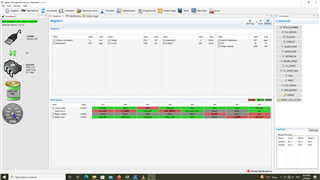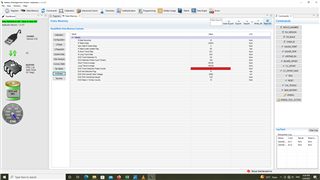Tool/software:
Hello,
This is a linked thread. We were trying to implement learning of discharge of LSH-20 Battery (Make: Saft, Capacity: 13000mAh) for EOS detection.
We restarted the test with a fresh battery after replacing the Current sense resistor from 2 mOhm to 100 mOhm.
We were following the standard documented method for learning pulse:
Method 1:
1. Set GE pin high.
2. Check the Operation config is in EOS mode. It reads 0x02 which means EOS mode is enabled.
3. Send the GAUGE_START command and then apply the pulsed load which causes around 150mV drop in our case which is visible in BQ Studio.
4. After 2% discharge, turn off the pulsed load and then send the GAUGE_STOP command.
5. Wait for G_DONE bit to go high after 15-20 seconds and then Read all parameter values.
6. Set GE pin low.
7. Giving a rest period of 05:30 hours before next pulsed load.
Earlier with old current reading resistor i.e. 2 mOhm, the test readings were looking inaccurate, then TI asked us to change the above Method with the following one:
Method 2:
1. Discharge the battery by 2%.
2. Rest the battery for at least 5 hours.
3. Set GE pin high and send GAUGE_START command.
4. Apply the pulsed load for 1 second only.
5. Send the GAUGE_STOP command.
6. Wait for G_DONE bit to go high after 15-20 seconds and then Read all parameter values.
7. Set GE pin low.
Now, with a same single fresh battery and current sense resistor 100 m, we observed slightly different reading of Measured Z and Scaled R with above two methods.
Date 26-Apr-2025
2% discharge using METHOD-1:
Measured Z: 9 mOhm
Scaled R: 295 mOhm
Date 27-Apr-2025
2% discharge using METHOD-2:
Measured Z: 6 mOhm
Scaled R: 197 mOhm
Date 28-Apr-2025
2% discharge using METHOD-1
Measured Z: 9 mOhm
Scaled R: 295 mOhm
Date 30-Apr-2025
2% discharge using METHOD-2:
Measured Z: 6 mOhm
Scaled R: 197 mOhm
You can see that readings are different with above two methods. Which of the above two Methods we need to follow to implement this learning cycle ?
With regard,
Sudarshan Chaudhary




